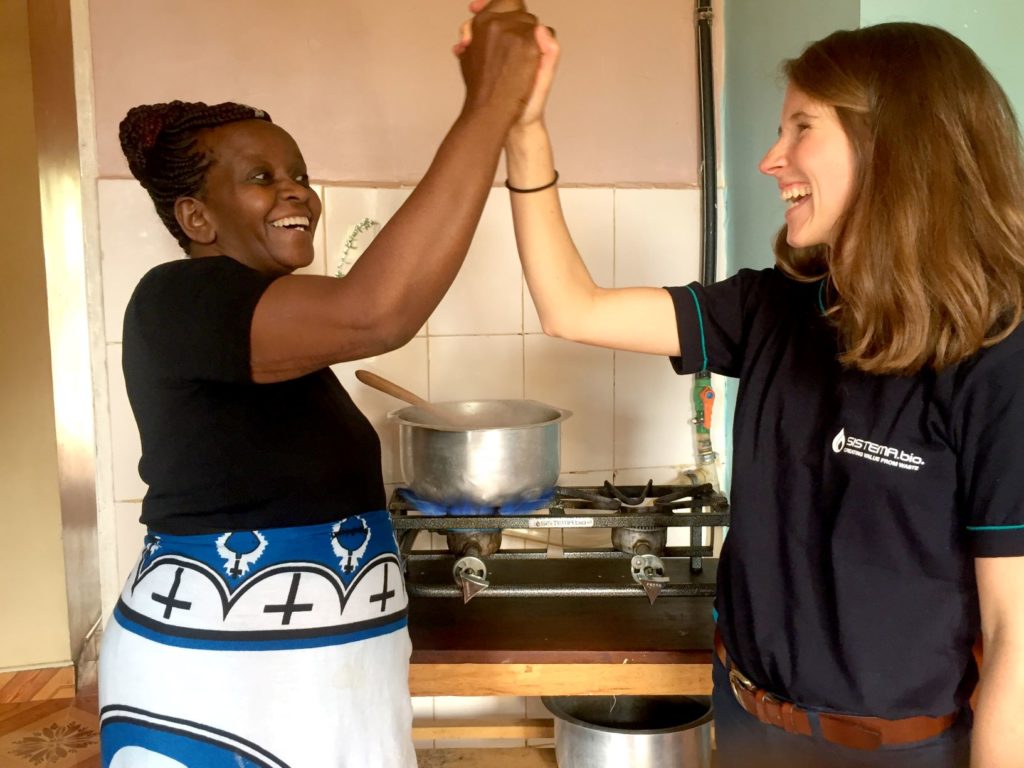COVID-19 and Women’s Energy Entrepreneurship: Esther Altorfer

The Clean Cooking Alliance, Sustainable Energy for All, ENERGIA, and members of the People-Centered Accelerator hosted a webinar featuring five women entrepreneurs and facilitated by Dr. Amanda Elam of Babson College. Representing business models ranging from solar lighting distribution to biodigester programs, the participants offered insights into how their roles as industry leaders are shifting as a result of COVID-19, and how they are devising innovative ways to remain operational during these unprecedented times.
Esther Altorfer joined Sistema.bio six years ago, serving in various functions across the finance and operations departments. Sistema.bio is a global social enterprise that first launched in Mexico 10 years ago, and has since expanded operations across Latin America, East Africa, and India. Premised on empowering smallholder farmers, Sistema.bio’s biogas systems convert animal waste into clean cooking fuel, thereby eliminating the use of firewood, charcoal, or LPG.
Esther is now a Managing Director, overseeing the company’s East Africa operations, which consists of 140 team members serving over 4,000 clients. Esther’s entire management team is made up of women.
Describing the beginning of the COVID-19 pandemic as “an emotional rollercoaster,” Esther shared how she adapted her leadership to immediately respond to health and safety concerns, and to plan for potential economic shocks to the business. Unlike many other companies, the fact that 80 percent of Sistema.bio’s Kenya staff operate in rural areas meant they were able to continue their work, albeit with new safety and health measures. Since Sistema.bio primarily works with farmers – who have generally been less affected than urban residents in terms of job losses – the company is currently doing better than the average bank in Kenya in terms of loan collections, according to Esther. Even though collections went down by around 30 percent in March and April, thanks to a renewed focus on collections across the credit, sales, and technical teams, Esther says, “June looks much better, which I am happy about.”
But while some aspects of Sistema.bio’s operations have continued as usual, the pandemic has impacted the company’s ability to expand to other East Africa countries. Sistema.bio had previously planned to launch partnerships in Uganda and Rwanda and to conduct initial trainings. Esther noted, “I think this has been the biggest impact on our business, not being able to travel to new countries to grow.”
Accordingly, Sistema.bio has adjusted its sales and revenue targets by focusing more on the unit economics and shifted in-person onboarding and training to online processes. According to Esther, this transition has brought a positive impact on the business:
“What I found really amazing is that not only are we training our Kenya team, but because everything is online, we were able to invite our India colleagues, which has been enriching in terms of sharing experiences across countries.”
All of these adaptations led to the month of May being Sistema.bio’s biggest month in sales since the company launched operations in Kenya three years ago. This accomplishment speaks not only to Esther’s leadership during this pandemic but also to the resiliency of Sistema.bio’s products and services.
“What’s been most impressive for me is that we realized that our product, the biodigester, is actually built to create resilience,” said Esther. “If you have a biodigester, you basically never have to leave your home and you have your own supply of cooking fuel. You don’t have to go out for charcoal. You don’t have to go out to buy LPG or look for firewood. And it also produces a biofertilizer that you can use on your fields and grow your own food. So, you’re basically resilience incarnated, and this resilience is really something that our team has felt and has taken on.”
